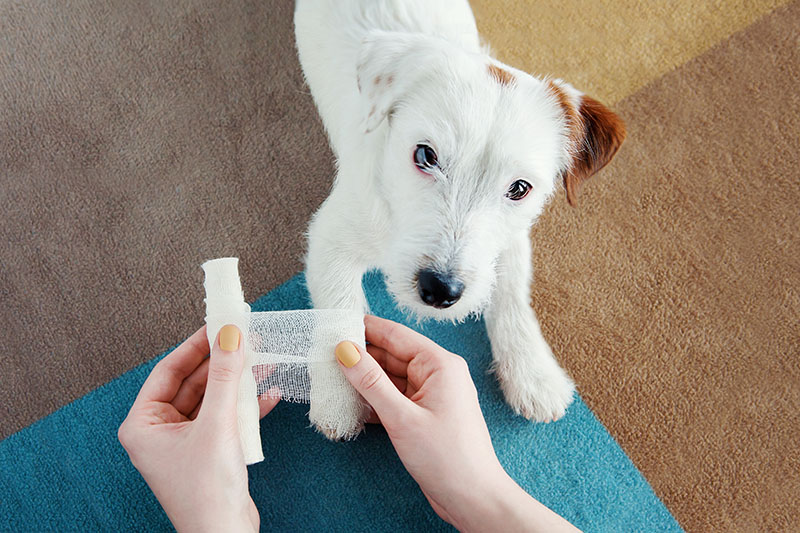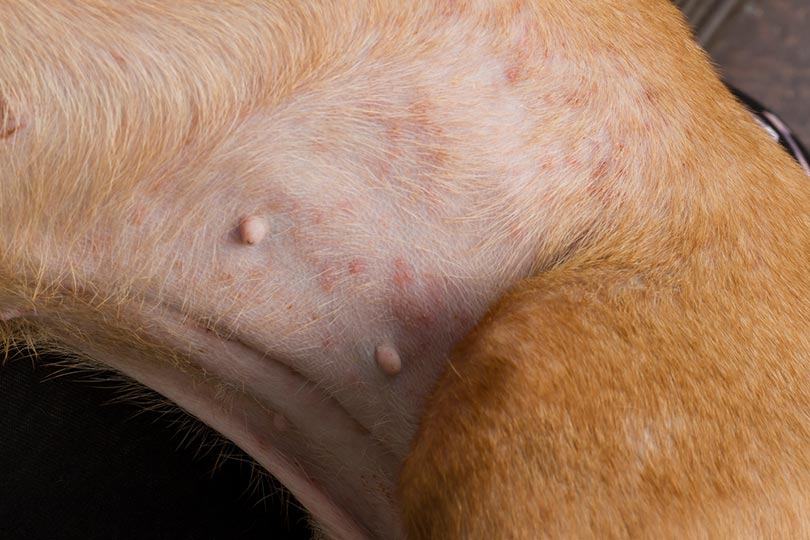If you own a dog, you know that they can have many strange behaviors. However, it can still be quite unexpected and unnerving when they start to scream. Your pet will often need immediate veterinary help, but not always. Keep reading for several reasons that your dog might start screaming and when to call the vet.
The 13 Reasons Why Your Dog Screams
1. Pain or Injury
Your dog might start to scream if they’re experiencing severe pain or have suffered an injury. Potential causes can include trauma, fractures, or internal issues. If your dog screams in pain, seeking veterinary attention immediately to identify and address the underlying cause is essential to getting them the relief that they need.

2. Medical Conditions
Certain medical conditions, such as cognitive dysfunction syndrome or hearing loss, can cause dogs to scream or make unusual noises. If your dog’s screaming accompanies other concerning signs like lethargy, loss of appetite, or changes in behavior, consult a veterinarian for a thorough examination and appropriate treatment.
3. Fear or Anxiety
High-pitched screams can be how your dog expresses fear caused by loud noises, unfamiliar environments, or past traumatic experiences. Creating a safe and comforting environment, early socialization, training, and positive reinforcement can help alleviate fear and anxiety. Consult with a professional dog trainer or behaviorist for guidance if you need help.

4. Territorial Behavior
Dogs may scream to defend their territory or warn intruders to stay away. This behavior will often accompany barking and other aggressive behavior. Proper socialization, training, and redirecting the dog’s attention can help address the problem, and consulting with a professional trainer can speed up the process and help ensure everyone’s safety.
5. Seeking Attention
Some dogs learn that screaming or making high-pitched noises grabs their owners’ attention, and they may use this behavior to seek interaction or rewards, especially when bored. To discourage this behavior, avoid rewarding it, and positively reinforce calm and quiet behavior instead. Provide regular exercise, mental stimulation, and playtime to fulfill your dog’s needs at a more convenient time each day.

6. Frustration
Dogs may scream out of frustration when they can’t access something that they desire. Setting clear boundaries, using positive reinforcement to reinforce patience, and providing appropriate mental and physical exercise can help them stay entertained in acceptable ways so they are less likely to become frustrated or explore restricted areas. Engaging in interactive toys or puzzles can also help redirect their focus.
7. Insect Bites
Getting an insect bite is one reason that many dogs might start to scream. A bee or other insect sting can cause immediate pain, while continuous biting from insects like fleas can frustrate your pet. Flea-and-tick medications can help, but you should take your pet to the vet if you notice a large lump or swelling. Other signs can include vomiting, itching, or diarrhea.

8. Separation Anxiety
Dogs suffering from separation anxiety may scream when left alone, as they can feel distressed and panicked by the separation from their owners. Gradually acclimate your dog to being alone using desensitization techniques to address separation anxiety. Start by leaving for only short periods, and extend them as your dog adjusts. Provide them with engaging toys and a comfortable environment, and consider consulting with a professional behaviorist for a tailored treatment plan, especially if your attempts aren’t working.
9. Communication
Dogs may scream to communicate with their human companions or other dogs. It can express excitement, eagerness, or a desire to play. Observing your dog’s body language and context can help you determine the intention behind the scream. Encourage appropriate communication through obedience training and positive reinforcement.

10. Reproductive Behavior
Female dogs in heat or during mating may use high-pitched screams or vocalizations to attract male dogs or signal their readiness to mate. Spaying or neutering your dog is recommended to manage reproductive behaviors and prevent unwanted litters. It can also help them stay healthier later in life. Consult a veterinarian for guidance on reproductive health and determining the appropriate time to undergo the procedure.
11. Bad Dream
If dogs have a bad dream, they might vocalize, though a scream would be rare. Other signs that they are in a deep sleep and dreaming include twitching and growling. If you suspect that your pet is having a bad dream, it’s better to leave them be, as they can get startled and might bite you if you try to wake or comfort them.

12. Aging or Cognitive Decline
Senior dogs or those experiencing cognitive decline may exhibit increased vocalization, including screaming or howling, due to confusion, disorientation, or age-related changes in behavior. Providing a calm and predictable environment, implementing mental stimulation activities, and seeking veterinary guidance for potential medical interventions can help manage the signs.
13. Breed Characteristics
Some dog breeds, such as the Shiba Inu, are known to scream or make distinctive vocalizations as part of their breed-specific communication style. Understanding and accepting these characteristics is important so you are not surprised by them. If the vocalizations become excessive or problematic, consult a professional trainer or behaviorist for help.

Summary
Your dog might be screaming for many reasons. If you have a Shiba Inu, it’s likely just part of their personality. Otherwise, you will need to watch your dog carefully to determine the cause to see if you need to call the vet. Many dogs scream in their sleep or when they are seeking attention. Others may scream to warn strangers and other animals to stay away, and you will likely get better help from a professional trainer to address these issues. However, if the screaming is from a medical issue or an injury, contacting the vet immediately is crucial.
Featured Image Credit: Peter Mayer 67, Shutterstock
Contents
- The 13 Reasons Why Your Dog Screams
- 1. Pain or Injury
- 2. Medical Conditions
- 3. Fear or Anxiety
- 4. Territorial Behavior
- 5. Seeking Attention
- 6. Frustration
- 7. Insect Bites
- 8. Separation Anxiety
- 9. Communication
- 10. Reproductive Behavior
- 11. Bad Dream
- 12. Aging or Cognitive Decline
- 13. Breed Characteristics
- Summary










